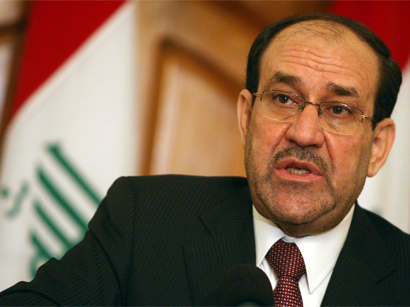Relations between Amman and Baghdad have become strained after leading figures in Iraq's Sunni opposition recently met in Jordan, where they vowed to continue their fight to "retake" the Iraqi capital from Iraqi Prime Minister Nouri al-Maliki, Al Jazeera reported.
The two-day meeting, which was closed to the media, brought together more than 150 delegates representing Iraq's Sunni tribes, Islamic rebel groups, and the Baath party. The participants formed a new coalition of Sunni opposition groups, which has yet to be named.
In a statement issued at the end of the conference, the coalition called on the international community to boycott Maliki's government, and for all segments of Iraqi society to unite against Maliki, among other things.
"We want the world to know that we strongly condemn Maliki's violence against [the] Iraqi people, be they Sunni, Christians, Turkmen, and even some Shia," Rad Abdul-Sattar al-Suliemani, head of the Tribal Council for Iraqi Revolution, told Al Jazeera.
Angered by the conference, Baghdad recalled its ambassador to Jordan and demanded clarification from Jordan over the meeting, which they considered as "interfering in Iraq's internal affairs". A statement released by Iraq's foreign ministry blamed some of the participants as being responsible for the bloodshed in the country, which has been gripped by increased violence since the US invasion in 2003.
Conference participants said they received invitations to come to Amman from the Jordanian government. Jordanian officials, however, denied their involvement. "This is not the first time our Iraqi brothers have held meetings on Jordanian land, and there are no exceptions [for such meetings] unless [they] threaten our security or intrude in the internal affairs of any other Arab country," Jordan's Foreign Minister Naser Judeh told reporters.
Some pro-Maliki newspapers had reported that the meeting was organised by Jordan under American supervision, but US officials also denied funding or participating.
"The US is committed to working with Iraq's leaders to move forward to form an inclusive government that represents all Iraqis. We urge all Iraqi leaders to remain focused on moving forward with government formation according to the constitutional timeline," Jared Caplan, deputy regional spokesperson at the US State Department told Al Jazeera in a written statement.
Some participants said they wanted to unify their ranks politically and militarily, and explore ways to reach out to the international community and Arab governments. Others also blamed Maliki for cracking down on Sunni-led demonstrations in Anbar in December 2013.
"After all the massacres the Maliki government committed against our people, we all went out with our arms to defend our land, religion, and honour," Ahmad Dabbash, founder of the Islamic Army, told Al Jazeera on the sidelines of the conference.
Sunni leaders said no members of the Islamic State group - which has taken control of Mosul, Iraq's second largest city, and other large swathes of Iraq since June - were present in Amman. "The Jordanian government is sensitive to the situation of the Islamic State, so they did not invite [its members]," Suliemani told Al Jazeera.
Conference participants did not disassociate themselves from the group, instead referring to Islamic State fighters as part of the wider Sunni uprising in Iraq. "There is no doubt, the Islamic State ... has its ideologies and agendas, but they make up 15 percent of Iraq's Sunnis, and we share similar goals," Dabbash told Al Jazeera.
Caplan, of the US State Department, expressed concern that "several of the groups participating in the conference have a long history of endorsing and/or carrying out violence against the US" and that the delegates did not explicitly condemn the Islamic State group.
"We are also very troubled that the conference communique failed to condemn the atrocities carried out by [Islamic State], and that the communique did not distance the group from extremists," he said.






